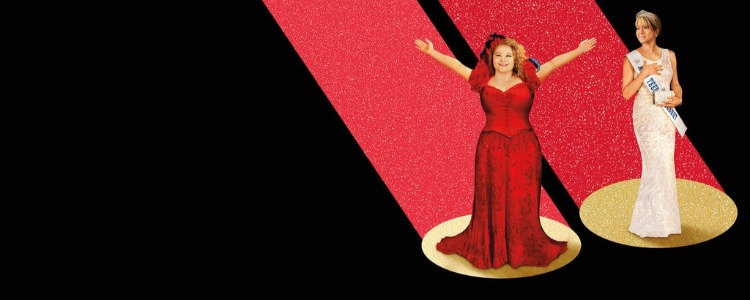Lessons Learned While Watching Dumplin’
Dumplin’, a new Netflix film based on the YA novel by the fabulous Julie Murphy, was released earlier this month and has since warmed its way into our hearts and homes.
As a curvy girl in recovery from binge eating disorder (BED), I am usually skeptical and unimpressed by TV and movies broaching the subject of body positivity. More often than not, media representations of fat actors and actresses rely on the predictable skinny-girl-trapped-in-a-fat-body trope. And let’s not forget the fat, funny, asexual best friend whose main role is to provide comedic relief. Dumplin’ was different. It wasn’t filled with cheap fat jokes nor did it perpetuate the stereotype that a character of size must be miserable, lazy, and self-indulgent. Instead, Dumplin’ provided an authentic look into the thoughts and emotions of a teenage girl living in a body that society – and her mother – deems less than ideal, and the importance of love and friendships, especially where you least expect it.
Below, I compiled a list of seven lessons learned (or reinforced) by watching Dumplin’. If you haven’t seen – or read – Dumplin’ yet (what have you been doing?!), I encourage you to stop reading, carve out 110 minutes of well-deserved self-care, and watch this heartwarming movie. You’ll laugh, you’ll cry, and if you’re anything like me, you’ll sing a little “Jolene.” And for those of you who didn’t take my advice: spoilers ahead… you’ve been warned!
1. We all need an Aunt Lucy in our lives
Aunt Lucy (Hilliary Begley) is the badass feminist role model every little girl needs. She is unapologetically herself and teaches her niece Willowdeen “Will” Dickson (Danielle Macdonald) how to like her name, her body, and all things Dolly Parton. Many of us might not be fortunate enough to have a relative like Aunt Lucy to cheer us on and make us believe we’re the most important person in the world, but we all deserve this. Whether your Aunt Lucy is a friend, family member, colleague, therapist, mentor, drag queen channeling their best Dolly Parton, or a combination of a couple of special people, we all deserve someone who sees and values us.
2. If someone gives you a magic 8 ball, invites you to watch a meteor shower, and kisses you, it means they like you
Thank goodness for friends like Ellen (Odeya Rush) to state the obvious: “Boys don’t get girls sweet little presents unless they’re trying to get their attention.” Listen, Will, I get it; I’ve been in your shoes questioning why and how someone like Bo (Luke Benward) could like me of all people. My recovery and ongoing journey to self-compassion allows me to see my beauty and worth and to embrace this even when others don’t. Now, instead of wondering why someone likes me, I wonder how they could not like smart, vulnerable, and compassionate me. Like Will, you may think your crush doesn’t notice people like you, and while this may be a common feeling, we can all use the reminder that we are deserving of love just as we are.
P.S. Did anyone else swoon when Bo said, “Willowdeen Dixie, I think you’re beautiful. To hell with anyone else who’s ever made you feel less than that.” Dating prospects, take note.
3. Don’t judge a book by its cover. Don’t judge a person by their size.
As much as Dumplin’ tugged on my body positive heartstrings, I couldn’t help but notice the amount of judgement coming from all sides. It is clear from the start that Will’s mother and former beauty queen, Rosie Dickson (Jennifer Aniston), disapproves of her daughter’s weight. Rosie believes it is harder for big girls to get opportunities, and when talking about Aunt Lucy, she states, “If [Lucy] took better care of herself, she would probably still be here.” Listen to me, and listen closely: you cannot determine a person’s health (or potential) simply by looking at them. Unfortunately, Rosie is not alone in her thinking. Many people – friends, family members, and strangers alike – make comments to/about folks in higher weight bodies under the guise of so-called concern. While these comments may be well-intentioned, research shows that body policing can encourage disordered eating and have counterproductive effects.
4. Every body is a swimsuit body
One of my favorite scenes from the movie is when Will and Ellen walk out for the swimsuit competition in complementing bathing suits that read “EVERYBODY IS A” on the front and “SWIMSUIT BODY” on the back. When signing up for the pageant, Will tells her mother Rosie, “As far as I’m concerned, a swimsuit body is a body with a swimsuit on it” Ain’t that the truth, Will!
5. Words don’t mean anything unless you let them
Acutely aware of her mother’s disapproval of her shape and size, Will despises that Rosie calls her “Dumplin’.” Rosie doesn’t understand why Will gets so upset about a “silly little nickname.” However, Will explains that the nickname is a reminder of how Rosie can’t stand that her daughter looks like a “round little dumplin” instead of your conventional beauty queen. When Ellen sees how this nickname affects her friend, she reminds Will that “Dumplin” is just a word that doesn’t mean anything unless she lets it. Ellen follows up with another statement of empathy, “but if it hurts you, it hurts me.” Now that’s a supportive friend!
6. The importance of loyalty
Will might’ve set out to sabotage the pageant at first, and you see her change of heart when the pageant judges ask her to define what loyalty means to her. “Loyalty,” Will responds, “means never giving up on someone, even though doubts and differences. It’s a noun, with action, fueled by shared experiences, which are memorable, meaningful, and irreplaceable. But loyalty isn’t blind love. It shouldn’t be taken for granted. Loyalty means telling someone when they’re wrong when no one else will. And loyalty means apologizing when you’re wrong because of the trust you’ve built over time. Loyalty is true friendship.” I’m not crying, you’re crying.
7. “Figure out who you are and do it on purpose”
If Dumplin’ was a delicious cherry lime snow cone on a Monday over the summer, this quote by Dolly Parton would quite literally be the cherry on top. There are many fantastic Dolly-isms sprinkled through the film, and the underlying message of figuring out who you are and doing it on purpose takes the movie from being a cute little film to one with heart, direction, and a source of inspiration.
So thank you, Dumplin’ – and Dolly – for coming into our lives this December. Thank you for showing us the beauty of friendships, even in unexpected people and places, and for encouraging us to, above all, figure out who we are and do it on purpose.
Chelsea Kronengold has been involved with the National Eating Disorders Association (NEDA) since 2012 as a walk coordinator, Proud2Bme intern, and programs consultant. After receiving an MA in clinical psychology from Columbia University, Chelsea joined the NEDA staff as a program associate, and currently serves as the Senior Communications Associate. Chelsea oversees NEDA’s social media and is a master trainer and coordinator for NEDA’s implementation of the Body Project. Chelsea frequently speaks on behalf of NEDA about her personal and professional experience with body image, eating disorders, media literacy, and weight stigma; she has appeared in national media platforms including Teen Vogue, Huffington Post Live, Seventeen Magazine, WebMD and SiriusXM Doctor Radio.





